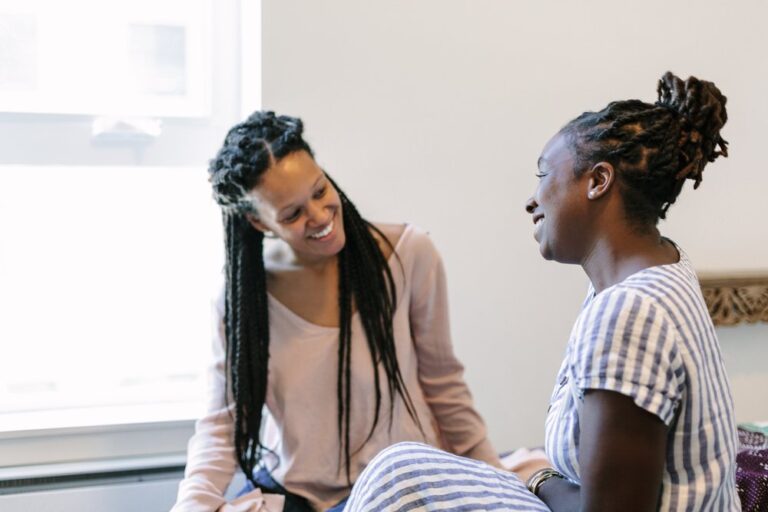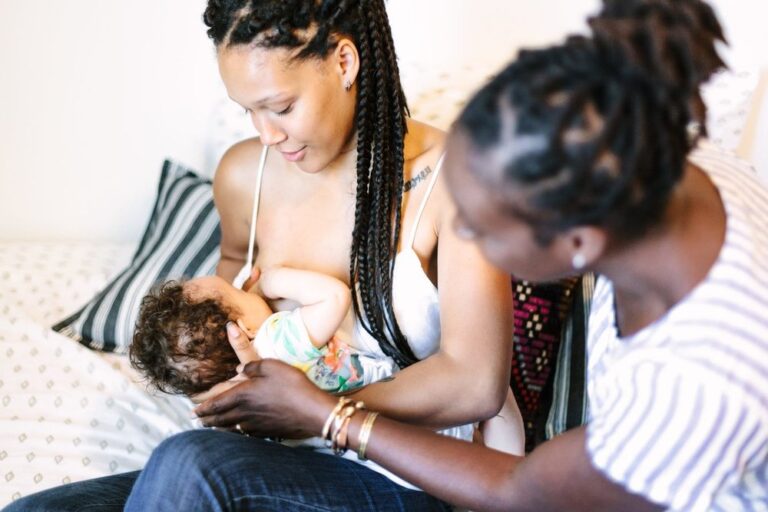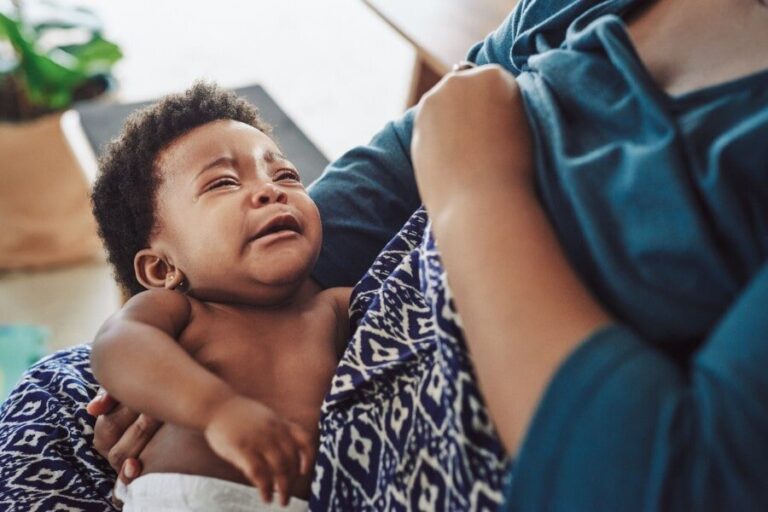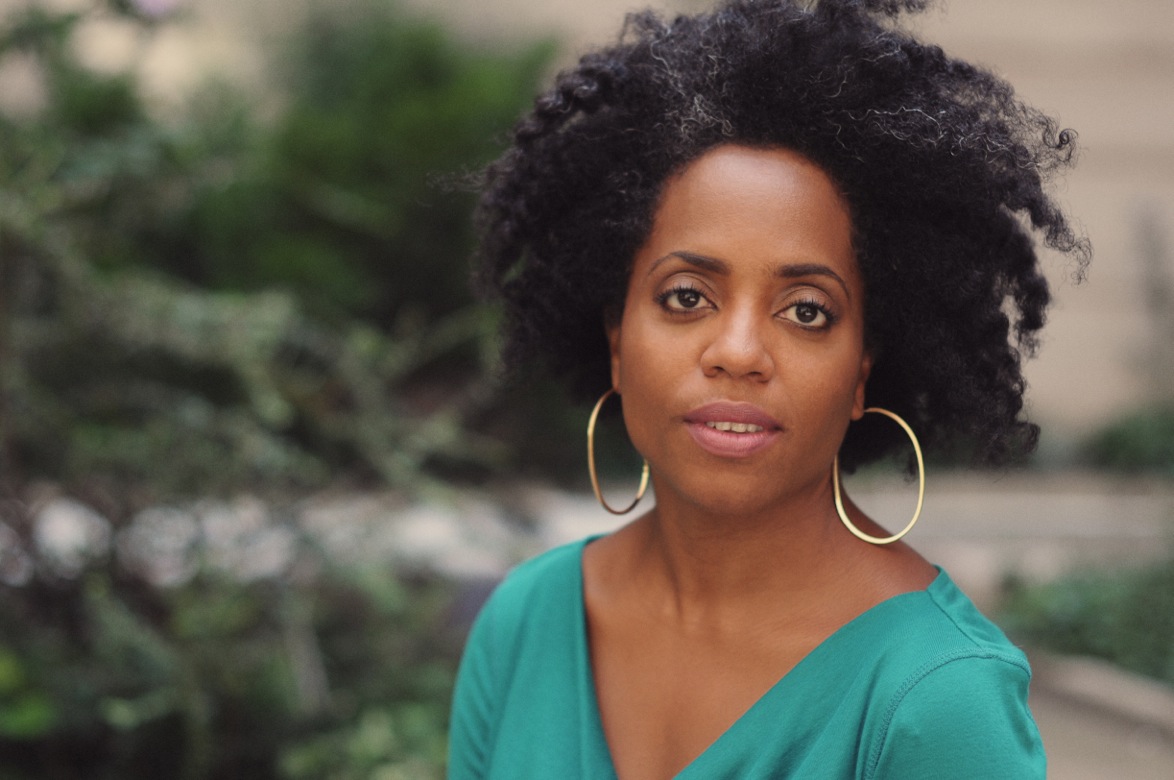This piece is part of our Empowered Birth series, highlighting ways Black women can have birth experiences that leave them and their families feeling safe and respected. Click here for more stories.
Chloe Louvouezo celebrated her 30th birthday in grand fashion—as part of a one-month trip zigzagging across the Continent with her partner. After spending 12 days each in Ethiopia (where he’s originally from) and the Republic of Congo (where her family lives), they spent the last leg of their trip in South Africa.
But, unbeknownst to the pair, they had a stowaway with them for every part of the journey: their son Myel.
“We went to a couple of rooftop gatherings,” Chloe recalls, “and I threw up every time I drank. I was like, ‘Oh my God, 30 is no joke! You can’t hold your liquor anymore when you turn 30!’
“A friend said, ‘You got something cooking in the oven,” she continues, “I was like, ‘That is *not* what’s happening, I am just getting old.”
But when the nausea didn’t go away—and other tell-tale symptoms popped up—a pregnancy test confirmed her friend’s suspicions.
Learning that she was pregnant helped Chloe set a new pace.
”I always have a lot of things going on,” she says, “but this calmed my butt down and made me appreciate what was happening in my body.”
It also greatly shaped her perspective in other ways, too. After discovering some of the darker sides of the medical industry, Chloe decided to have an unmedicated delivery—an intention that she’s continued almost two years after the birth of her son.
“I haven’t even taken a Tylenol since then,” Chloe says. “It’s radically changed how I see the world in terms of not allowing business-driven industries to influence my health and wellness. Now I try to be more aware of how systems misguide consumers and manipulate our autonomy, and I lean toward options that break those patterns.”
Chloe tells us how her pregnancy and delivery helped her acquire this new worldview.
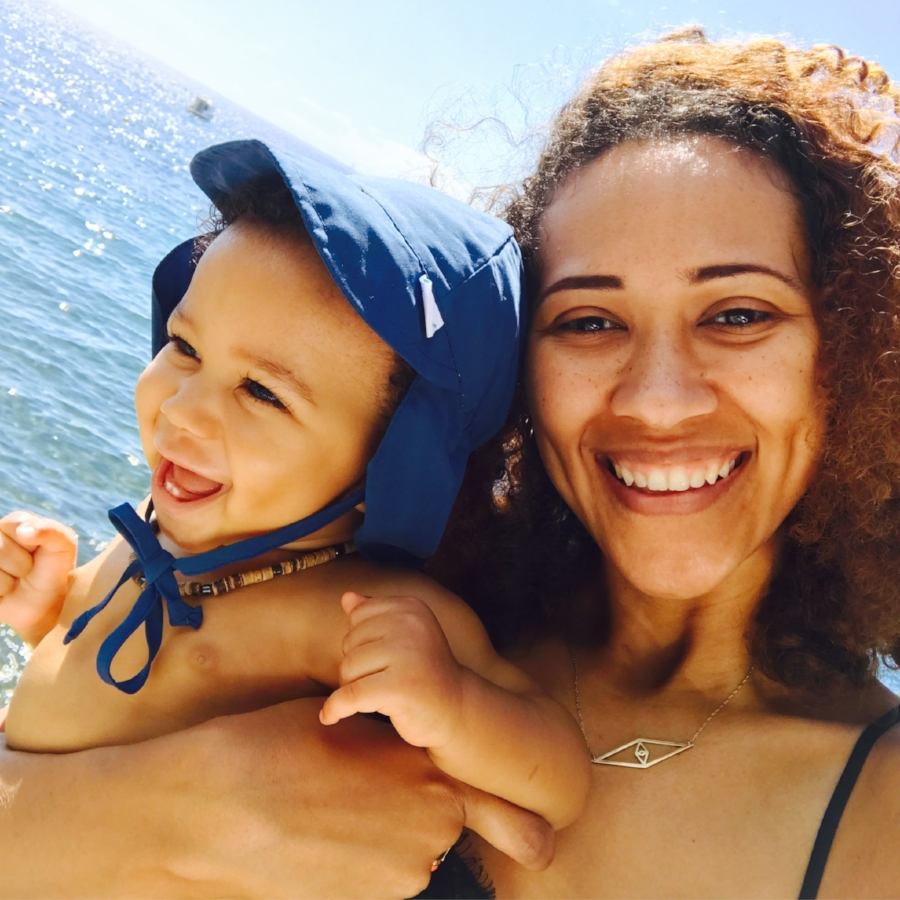
A Birth Plan 180
I was the first of my friends to get pregnant and I don’t have sisters who have gone through the process before, so I initially assumed I would be delivering in a hospital. I looked up the hospitals in my area and chose one.
But then I saw a documentary that made me do a 180 on my birth plan: The Business Of Being Born.
After watching that documentary, I started to question the medical industry’s influence on the birth process. We pay into systems that are insurance for the 1%, but we’re not reaping any of the benefits as individuals or as a community.”
Literally, in the middle of the documentary, I was like, Yep. Doing a home birth.
Still, I explored all the different options before committing to a home delivery: birth at an independent birthing center, at birthing centers within hospitals… And for every option I considered, I honored my particularity because I wanted an experience that really spoke to me.
I didn’t want my experience to be run by an institution that was going to clock every minute I laid in their bed
The birthing center I toured felt like an elder’s home. The old furniture made me wonder, Ok, does that mean the mattress is old too? And, knowing I get claustrophobic when I’m in pain, I knew the skinny hallways wouldn’t work for me. I wanted open space. I also wanted to know my way around.
One of the biggest takeaways I had from that documentary, from conversations with mothers, and from reading about hospital births is that medical professionals act as if being ready to give birth means something is wrong and needs to be fixed, when that often isn’t the case.
I’d heard women who’ve had hospital births share their experiences of feeling neglected or pressured by their doctors to do one thing or another. I didn’t want my experience to be run by an institution that was going to clock every minute I laid in their bed, upcharge for basic amenities, or dictate the medication I took or the position in which I gave birth. And I didn’t want strangers wearing hospital masks hovering over me during what should be an intimate moment.
I can not really operate or perform at my best if my mind isn’t at peace. And I knew that if I felt violated or intruded upon, it would set the tone for everything else. So I decided to go with a home birth because it would allow me to curate the experience I needed.
Finding My Sister-Friend Midwife and Mama Village
Starting at 20 weeks, I switched from an OB to a midwife.
I chose Dr. Kai Parker to be my midwife. My partner found her in a Google search, I think through comment recommendations on a blog.
I initially couldn’t reach her, but she called me back at 10:30 p.m. that night. At first I was like, Why is this doctor calling me so late?
But we were on the phone for an hour and half, and we just clicked. A lot of the midwives I met before were older aunty types. I felt nurtured and cared for by them, but the energy Dr. Kai brought even to the phone call… I felt like she was my sister-friend. And she is now, to this day—she’s actually my son’s pediatrician as well.
Finding a Black midwife wasn’t a priority when I first started my search, but once I met her, it felt like a perfect fit. She takes a holistic approach to wellness and treatment, which was refreshing. I felt safe putting my body in her care.
A week before my due date, I still hadn’t taken any sort of prenatal breathing classes. My midwife referred me to a place called Mamatoto Village, a community of Black women who have chosen a holistic path to birth and motherhood. It is for us by us. As soon as I walked in, children of all ages were running around. Moms, aunties, and other women were making lunch for whoever was stopping through—it was such a welcoming environment.
Leading up to my due date, my midwife and I began solidifying my birth plan, which was a two-page document detailing everything I wanted to be done or considered during the labor and birth process.
If I can get through this, then I’ll be less fearful of other intimidating experiences.
It had things on it like, “When I’m uncomfortable and I want to change my clothes, this is what I want to wear.” “This is the temperature I want the shower to be if I want to take a shower.” I chose my music, lighting, and smell of incense. I covered every detail in the plan.
Dr. Kai visited my home twice before the birth to do a walk through, so she knew where to find everything I might need during birth. And we went over my birth plan together.
In hindsight, as meticulous as I was, I ignored a lot of those details in real time. I was so in the moment and completely distracted by labor that the only two things I was sensitive to were the lighting—I wanted them off to be in pitch darkness—and wanting to hear the sound of the faucet water running.
Netflix and No Chill
When I went into labor contractions, I was by myself for the first two hours.
I thought I could do a Law & Order: SVU marathon, lay in the bed, and the contractions would fade away. I wasn’t ready. We were two days early.
But the contractions soon became too intense to ignore. You’re being really ridiculous right now, I thought. You can’t Netflix it away.

My partner came home, and he helped me breathe through the entire labor by ourselves. We found our pace and spooned on the bed during my contractions. When they intensified, I would squeeze his hand really tight and follow his rhythm of breathing. In between the contractions, we fell asleep until the pain would return and wake us up. We did this on repeat throughout the night.
It was good, it was so good. I’m grateful that we were able to find that rhythm together. It was perfect to have had the experience of laboring by ourselves, and I wouldn’t have wanted the midwife to arrive any sooner.
When the contractions were finally two minutes apart, we told the midwife to come. She arrived at 3:40 a.m. My mom lived a couple of blocks away, and she came over around the same time. So it was my midwife, the midwife’s assistant (who’s also the founder of Mamatoto), my mom, partner, and myself.
When my midwife arrived, she checked and said, “You’re 8 cm dilated.”
She lied though. [Laughs] She said that so I wouldn’t freak out, but I was actually 10 cm dilated.
But believing that I was 8 cm, I felt like I’d won a battle because I knew we were so close. I was like Michonne from Walking Dead, like, “C’mon, let’s do this!”
The pain got worse and my water hadn’t broken yet, so I went into the shower to let the hot water hit my back.
Before I went on maternity leave, I asked a colleague, “How do you know it’s your time to push?”
She said, “Oh, you’re going to know, because it’s going to feel like you have to take the biggest shit of your life.”
And I was like, “Ok, I will remember that!” [Laughs]
Throughout the entire labor, I actually didn’t scream, didn’t moan, barely made a sound. I just silently clenched my teeth, tensed up, and released—until I felt that feeling. Suddenly, while standing in the shower, I yelled, “I HAVE TO SHIT!”
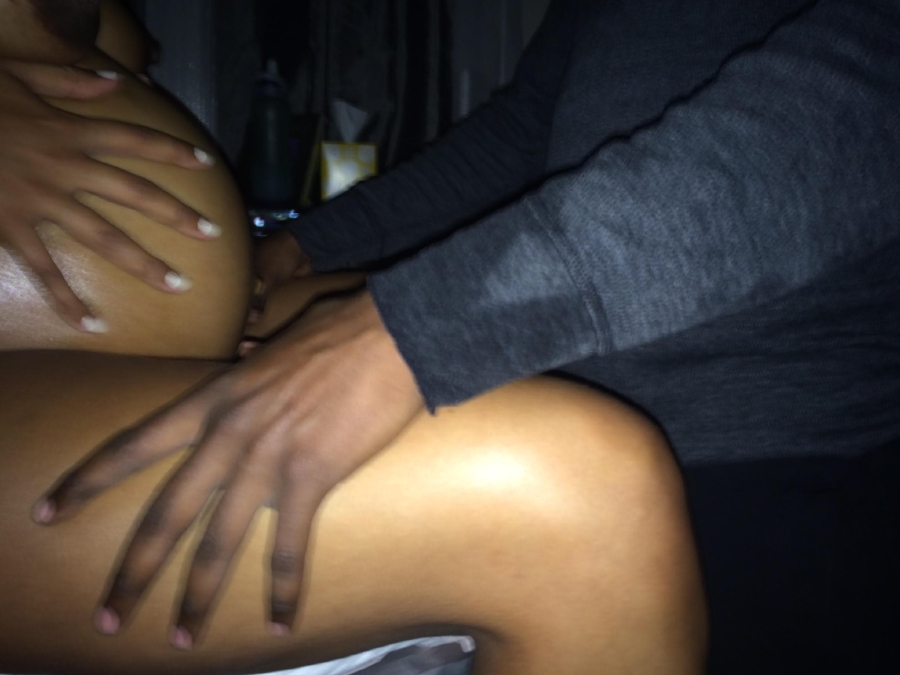
I quickly got on the toilet and almost immediately, my water broke. They put a pillow behind me, and the midwife and my partner were kneeling on the floor right next to me. I put one leg on one of their shoulders, one leg on the other. That position felt so comfortable that after the midwife felt the baby crowning, I was like, “Let’s just do it here.”
The midwife assistant guided me to push three times on the toilet before I remembered that I wanted my partner to catch the baby as part of my birth plan. So we moved back into the bedroom so that I could deliver on the birth stool where he’d have clear access.
I pushed four or so more times, and remember being literally mid-way through—with the baby’s head out, then half of his body—and with a final push he was out! [Laughs] It was so great. The whole experience, from the first contractions to the baby’s birth, lasted eight hours, which, from what I’ve heard, is fairly short.
We had chosen to not know the sex until the baby was born. All through pregnancy, I knew that it was a boy—I just knew.
After my partner caught him, he brought him to me to do skin-to-skin right away. I kept saying, “Oh my God!” as in “Oh my God, I can’t believe that just happened! I have super powers!” which turned to “Oh my God, there were five of us in the room and now there are six!” I was completely in awe.
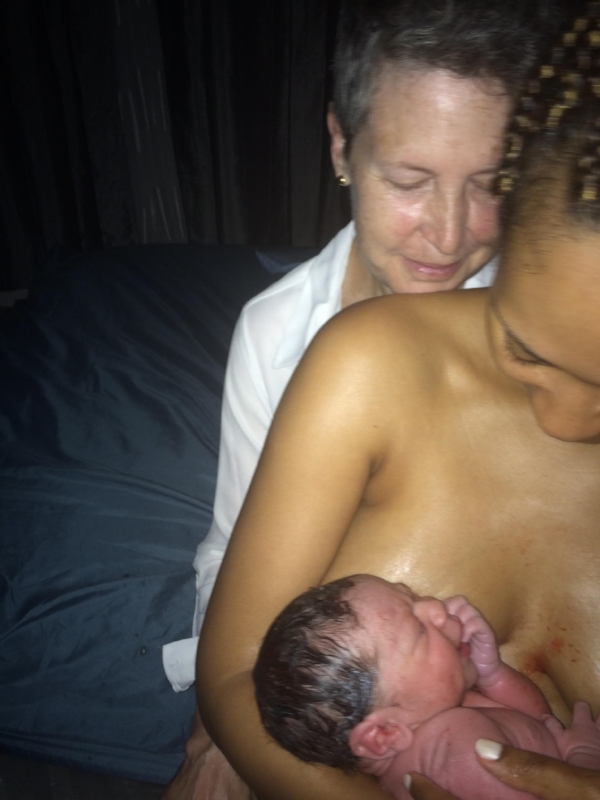
It wasn’t until three minutes after the baby was out and we were all huddled around gazing at him in my arms that I was like, “Wait! Is it a girl or a boy?” It hadn’t even dawned on me yet to ask!
It took us awhile to unwrap the umbilical cord, and it was a boy. I love that even before becoming a mother in the flesh, I had motherly instincts and knew that it was a boy.
One of the best things about a home birth is that you can immediately relax in your own space. Within 15 minutes of giving birth, I rolled over on the bed and we took our your first family nap while everyone cleaned up and slipped away quietly, leaving us with the home to ourselves.
I can’t emphasize enough the power of our own thoughts. Whether it’s pressure or comparison from family, society, or social media, I think it’s important to be conscious of how we let influences mold our perspective on major life decisions like birthing methods. When we do allow these external elements to penetrate our judgement, we either make decisions based on expectations or fear. But if we allow ourselves to be free of that type of conditioning, I believe we can really do anything.
I took on [home] birth as a personal challenge, because as a first-time mom it really does seem terrifying! But I thought that if I can get through this, then I’ll be less fearful of other intimidating experiences. What lies on the other side is the biggest reward of motherhood. And you truly feel unstoppable.



